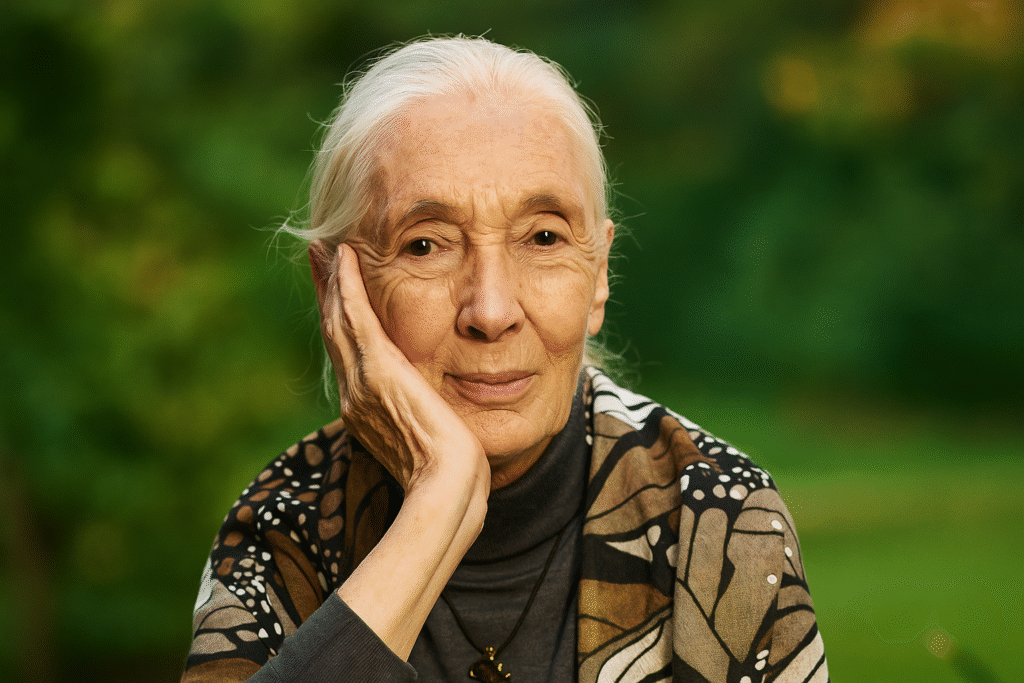By Harshit, October 1, 2025 | California | 2:00 PM EDT
Jane Goodall, the pioneering British naturalist whose groundbreaking research on chimpanzees in the African wild reshaped the world’s understanding of human evolution and animal behavior, has died at the age of 91. The Jane Goodall Institute confirmed on Wednesday that she passed away in California of natural causes.
The institute described her as a scientist who “revolutionized science” through her discoveries and lifelong commitment to wildlife conservation. Goodall’s legacy stretches far beyond research, encompassing education, activism, and advocacy for both animals and the planet.
Transforming Science Through Observation
Goodall’s career began in 1960 under the mentorship of famed anthropologist Louis S.B. Leakey, who sent her to Tanzania’s Gombe Stream National Park to study chimpanzees. Within months, she made a discovery that would change science forever: chimpanzees not only used tools but also made them. This observation challenged the long-held belief that toolmaking was a uniquely human trait.
Her meticulous fieldwork revealed other startling parallels between humans and chimpanzees. She documented chimps hunting prey, eating meat, forming emotional bonds, grieving lost kin, and even waging violent territorial battles. These findings forced scientists to reconsider the boundaries between humans and other primates.
Breaking Barriers in a Male-Dominated Field
When Goodall began her work, primatology was dominated by male researchers who viewed her approach with skepticism. Her habit of naming chimpanzees — including the famous David Graybeard, Flo, and Mr. McGregor — was criticized as unscientific anthropomorphism. But over time, her detailed observations earned respect, and her critics acknowledged the rigor of her methods.
By the 1970s, Goodall had become a household name thanks to National Geographic documentaries and books that brought her chimpanzees’ lives to millions worldwide. Biologist Stephen Jay Gould would later call her work “one of the Western world’s great scientific achievements.”
Global Conservation Advocate
Beyond science, Goodall was a tireless campaigner for the environment and wildlife preservation. In 1977, she founded the Jane Goodall Institute, which became a global leader in conservation and education. She later launched Roots & Shoots, a youth-focused program now active in more than 130 countries, and TACARE, which promotes sustainable development in African communities.
Even in her 80s, she traveled more than 300 days a year, urging people to fight deforestation, protect endangered species, and adopt sustainable lifestyles. Her voice resonated particularly with young audiences, inspiring generations of conservationists.
A Life Shaped by Curiosity
Born in London in 1934 and raised in Bournemouth, Goodall’s fascination with animals appeared early. At age five, she famously hid for hours in a henhouse to observe how chickens laid eggs. Her mother encouraged her curiosity rather than scolding her, nurturing a passion that would define her life.
Inspired by adventure stories like Doctor Dolittle and Tarzan, Goodall dreamed of living in Africa. She achieved that dream in 1957 when she moved to Kenya, where she met Leakey. His decision to send her to study wild chimpanzees — despite her lack of formal scientific training — set her on the path to becoming one of the most influential scientists of the 20th century.
Later Life and Legacy
Goodall’s personal life included two marriages — first to filmmaker Hugo van Lawick, with whom she had a son, and later to Derek Bryceson, head of Tanzania National Parks, who died of cancer in 1979. Despite personal challenges, she continued her fieldwork at Gombe, compiling one of the world’s longest-running studies of wild animals.
Her observations of chimpanzee “warfare” in the 1970s shocked the world and altered views of primate behavior, highlighting both the light and dark sides of human and chimp nature. Over the decades, she wrote more than two dozen books, appeared in countless documentaries, and received honors such as the National Geographic Society’s Hubbard Medal and the United Nations Messenger of Peace designation.
Goodall’s death marks the end of an extraordinary chapter in science and conservation. Yet her influence endures in the countless researchers she inspired, the institutions she founded, and the millions of people moved by her message that humans are not separate from nature but deeply connected to it.

